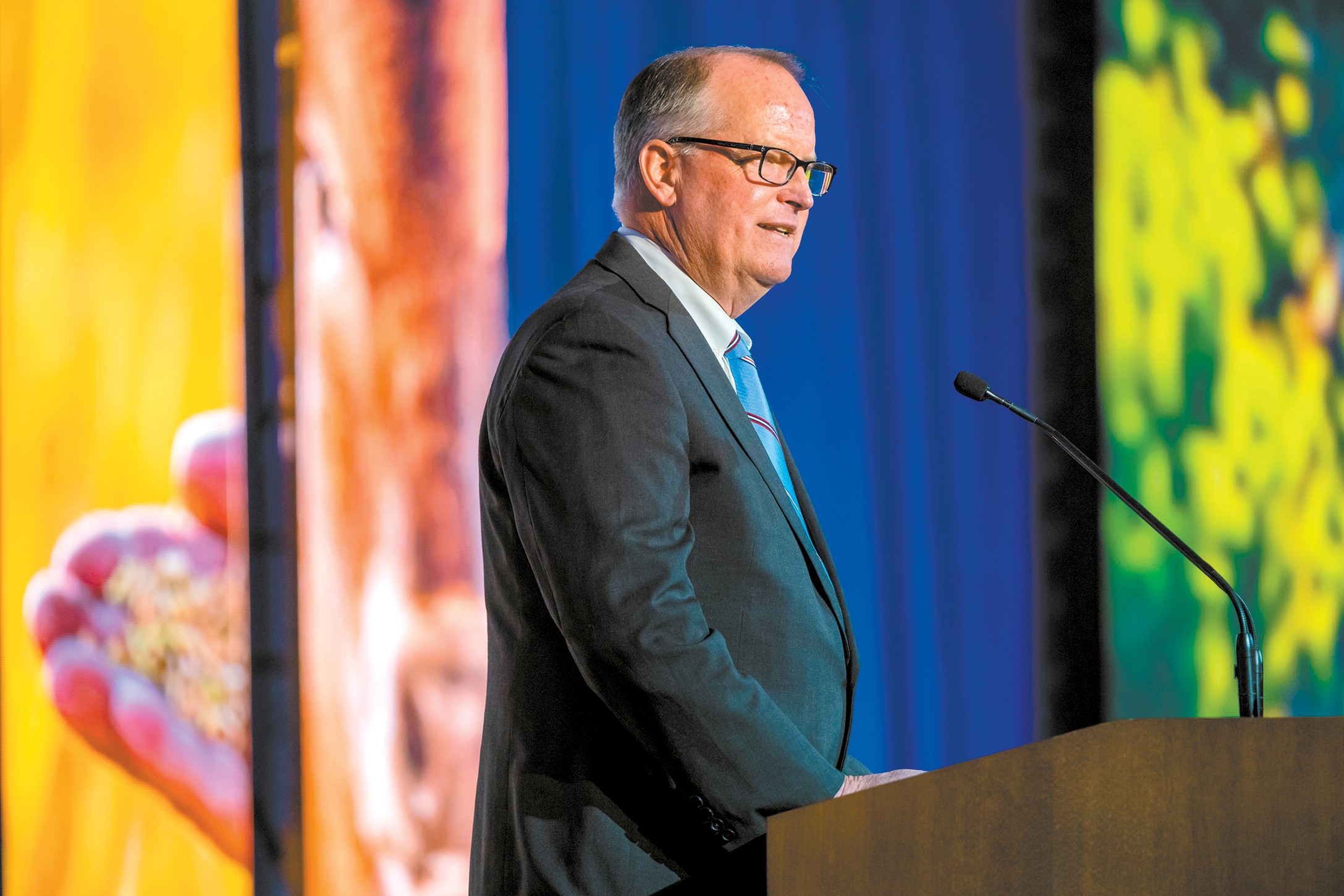Johansson urges support to sustain farms

California Farm Bureau President Jamie Johansson gives his address during the 105th Annual Meeting of the California Farm Bureau in Reno, Nevada. He called on lawmakers to reject policies that ask farmers and ranchers to be resilient in the face of unaddressed challenges.
Photo/Brian Baer

By Peter Hecht
California Farm Bureau President Jamie Johansson called on lawmakers to work to sustain agriculture into the future by securing water supplies and rejecting policies that merely ask farmers and ranchers to be resilient in the face of unaddressed challenges.
Speaking before the 105th Annual Meeting of the California Farm Bureau in Reno, Nevada, this week, Johansson outlined “extraordinary events that have put all California farmers and ranchers at risk.”
He pointed to impacts of a three-year drought that resulted in the fallowing of more than 1.2 million acres of productive farmland. That was followed in 2023 by atmospheric river storms and destructive floods that caused hundreds of millions of dollars in damages to California farmland and crops.
Johansson took issue with California’s failure to complete long-planned water infrastructure projects that could have stored water during wet years for use in dry ones and enhanced flood-control protections in years with heavy rains.
“While our members struggled, we faced administrations in Washington, D.C., and Sacramento who found it easy to blame it all on climate change,” Johansson said.
He took political leaders to task for simply declaring that “agriculture would have to do less to meet climate goals.”
Johansson said farmers and ranchers need supportive policies rooted in science, not politics. He said Farm Bureau remains committed to “defending the use of science on our farms, our waterways…and saving the next generation of farmers and ranchers.”
“I truly believe it must be Farm Bureau and our membership who leads the fight,” he said.
Johansson cited notable victories for California agriculture in 2023, including advocacy that led Gov. Gavin Newsom to sign an executive order that rolled back permitting requirements and bureaucratic red tape to allow farmers to divert floodwaters to recharge depleted groundwater aquifers.
As a result of the order, farmers were able to secure an additional 40,000 acre-feet in groundwater recharge in the San Joaquin Valley last spring and summer, he said.
“For 13 years, California Farm Bureau and some of our partners have been pushing the (California) State Water Resources Control Board to allow our farmers to use their land to recharge aquifers,” Johansson said. “This year, our efforts finally produced results.”
Still, Johansson said it was regrettable that it took “an act of God,” including catastrophic flooding, to ultimately get action.
He said agricultural leaders additionally sounded the alarm as massive amounts of floodwater were allowed to flow into the ocean—uncaptured—during much of the 2023 storms.
He said farming interests pressured the administration to reduce water releases from dams in the state. Newson responded by authorizing to maintain increased storage levels in the reservoirs.
“We haven’t always agreed with everything this governor has done,” Johansson said. “But it was a step that we should acknowledge.”
Johansson also applauded actions by the governor that fast-tracked Sites Reservoir, a planned off-stream water storage project north of Sacramento long advocated by the Farm Bureau.
But the Farm Bureau president expressed concern that California political leaders and policymakers continue to expect agriculture to live with water scarcity instead of striving to secure the necessary resources to sustain America’s largest food-producing state.
He took issue with water-supply curtailments for farmers and ranchers in the Scott and Shasta river watersheds that have continued despite 2023’s historic storms.
He also recalled when Farm Bureau organized a bus caravan to the state Capitol five years ago as California water officials contemplated water-supply restrictions and mandatory flows on the San Joaquin River and tributaries that would have resulted in “game over for agriculture” in the region.
“It was a desperate time,” Johansson said, noting the effort succeeded in staving off severe water-supply losses for farmers and ranchers.
Despite the importance of California’s agricultural economy, he said a common thread is repeated in policy circles. It suggests that farmers and ranchers should simply adjust to a steady decline of agriculture in the state.
Johansson cited a 2022 report from the Public Policy Institute of Califoria that declared “California’s farmers have shown an extraordinary capacity for adaptation to changes in prices, technology and the regulatory environment.”
Johansson said such conclusions imply that “we would simply once again be asked to be resilient.” He called that approach unacceptable for Farm Bureau and its members.
“After California’s multidecade practice of managing for scarcity, our vision became clear,” Johansson said. “California will not solve the issues of climate change by making farmers less efficient.”
During his address, Johansson recounted other key challenges that Farm Bureau has taken on in support of farmers, ranchers and the agricultural economy.
He pointed to a “crippled supply chain” and a port system that “all but melted down” during the pandemic and its aftermath. Farm Bureau responded by successfully pushing for federal legislation to upgrade ports and clear logjams that had stranded California farm exports.
There was passage of state Senate Bill 505, which Farm Bureau sponsored. The bill expanded the insurance clearinghouse program of the California FAIR Plan, the state’s insurer of last resort, to allow commercial policies for farm properties to move back to the competitive insurance market, creating more insurance options. The bill followed earlier Farm Bureau-sponsored legislation allowing farmers and ranchers who were denied fire insurance coverage to access the FAIR Plan for coverage.
Farm Bureau also successfully defeated a state mill tax increase that would have raised costs to agriculture by $50 million.
Johansson praised the signing of Assembly Bill 1016, which was inspired by a San Diego County farmer and Farm Bureau member. The legislation will expedite training and licensing programs so that more farmers may use drones for pesticide applications.
Johansson called the legislation the “vision of farmer-led solutions.”
“California and America respects the California farmer and rancher,” he said. “We simply have to stand up and be heard.”
(Peter Hecht is chief editor of publications for the California Farm Bureau. He may contacted at phecht@cfbf.com.)




